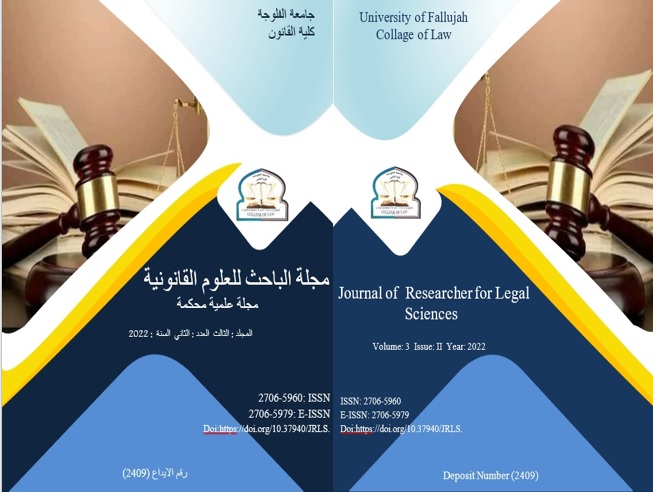Indexing
![]()

There is no doubt that intellectual output—particularly academic work—finds its true resonance in a book or a research paper published in a specialized scientific journal that adheres to regulations and conditions preserving the rights and intellectual property of the work. In this journal (Researcher Journal for Legal Sciences), conditions and rules have been set that are characterized by objectivity, with the primary aim of enhancing scientific research according to predefined mechanisms. These include evaluation criteria, expert reviews, publication guidelines, correspondence procedures, research tracking, and electronic plagiarism detection requirements. The journal's editorial management has strictly implemented these regulations to ensure that the journal genuinely becomes a haven for purposeful scientific production—untainted by any impurities or suspicions of academic plagiarism.
Additionally, the journal follows clear, objective procedures for research submission and evaluation, relying on disciplined, transparent, impartial, and confidential mechanisms aimed at instilling trust in researchers that their work will be assessed by purely scientific standards, free from bias or intellectual distortion. At the same time, it assures relevant academic and scientific institutions—particularly academic promotion committees in law faculties (both local and international)—that the research published in this journal is rigorous and valuable, meeting the standards of a peer-reviewed journal in both name and substance.
In support of the aforementioned, it can be affirmed that many research papers submitted to the journal have been rejected after being reviewed by specialized experts who found them unsuitable for publication. Additionally, some papers underwent revisions based on expert feedback and were not accepted into the journal until the authors implemented the required changes. The journal’s editorial management ensured that the expert reviewer was consulted once again to approve the publication and verify that the researcher addressed all previous notes and comments so the paper could meet the necessary scientific standards. This all stems from the editorial board’s recognition—along with the managing editor—that the ability to distinguish between quality and poor research is the foundation of the journal's credibility and the key to elevating its scholarly output.
Following the format of previous issues across the journal’s three volumes, this issue contains a diverse and rigorous collection of scientific research in various branches of both private and public law. In private law, the issue includes papers titled: The Application of Lease Provisions to Joint Ownership Agreements, The Effect of Gender Change on Personal Status Issues, Polygamy in Private International Law: Cultural Conflict and Conflict of Laws, Reflections on the Commercial Agency Law No. 79 of 2017, and Combating Illicit Gain – A Comparative Study.
In public law, papers include: The Legal System of the Administrative Judiciary – A Comparative Study Between Iraq and Egypt, Crimes Against Working Women – A Legal Study in Light of the Iraqi Labor Law No. 37 of 2015, and Violations by Private Military and Security Companies of International Humanitarian Law and Human Rights – Iraq as a Model.
Judicial rulings also had a place in this issue through commentaries and legal opinions, with the featured commentary titled: Spousal Support for a Non-Rebellious Wife.
Professor Dr. Raed Naji Ahmed
Editor-in-Chief
December 2022
|
This work is licensed under a Creative Commons Attribution-NonCommercial 4.0 International License. |
